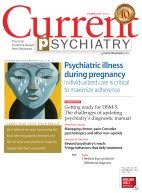Monday, June 1, 2009
Weight gain with antipsychotics: What role does leptin play?
Hua Jin, MD
Associate clinical professor, Department of psychiatry, University of California, San Diego VA San Diego Healthcare System, San Diego, CA
Jonathan M. Meyer, MD
Assistant professor, Department of psychiatry, University of California, San Diego VA San Diego Healthcare System, San Diego, CA
Clinical studies indicate that clozapine and olanzapine carry a high risk of treatment-related metabolic dysfunction—including weight gain, hyperlipidemia, and glucose intolerance—but certain patients with high metabolic liabilities who take atypical antipsychotics do not necessarily develop these adverse effects. Though the underlying mechanism for atypical antipsychotic-related weight gain is strongly associated with central histamine H1 antagonism and increased appetite, the pharmacologic basis for other metabolic changes is not fully understood and may involve weight-independent mechanisms.
One potentially relevant research area is peptide hormones’ impact on the regulation of food intake, body weight, and other metabolic parameters. As research has elucidated the properties of 1 of these hormones—leptin—investigators have started to examine possible correlations between changes in serum levels of leptin and weight gain during atypical anti-psychotic treatment.
This article summarizes available clinical data on the interaction of atypical antipsychotics with leptin and indicates directions for future research on interactions between psychotropic medications and metabolic hormones.
Read full text (free access)
Comment on this article
Email the editor
Subscribe to:
Post Comments (Atom)


No comments:
Post a Comment